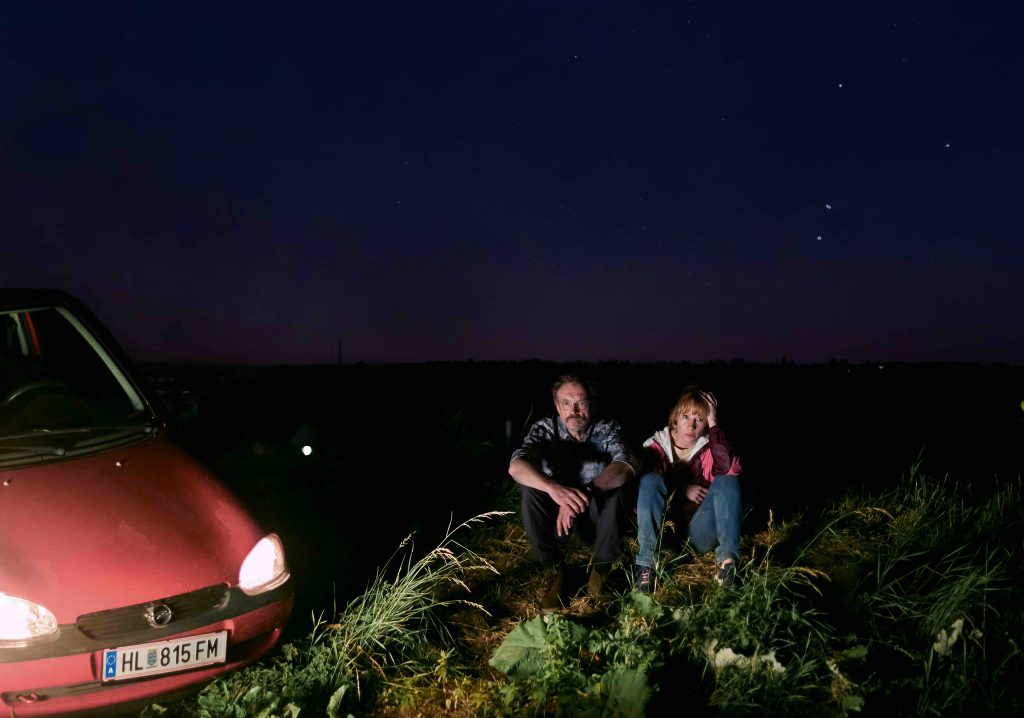A bittersweet black comedy about a policewoman in the Austrian backwoods whose plans for the future are thrown into disarray after a tragic accident.
FAST FACTS:
• Hilarious black comedy by Austrian star cabaret artist Josef Hader.
• World premiere in the Panorama section of the Berlinale
• Number one success in Austrian cinemas with more than 100,000 tickets already sold
• Hader’s directing debut „Wild Mouse“ reached 250,000 admissions in 2017.
CREDITS:
Country/year: Austria 2024; Running time: 90 minutes; Director: Josef Hader; Screenplay: Florian Kloibhofer; Cast: Birgit Minichmayr, Josef Hader, Thomas Schubert, Robert Stadlober, Thomas Stipsits, Maria Hofstätter; Distributed by: Majestic; Release: April 4, 2024
REVIEW:
You want to cry and laugh. Or maybe the other way around. Josef Hader makes sad films that are also endlessly funny. Or maybe the other way around. Depending on your point of view, depending on your personal mood of the day. One cannot be separated from the other, the sad cannot be separated from the funny, the funny cannot be separated from the sad. Because it’s about a very specific view of life, about striving and struggling and getting tangled up. About falling down and the question of whether you get up again or not. And how you do it or whether to do it at all. The work of a filmmaker whose gaze can be resigned, shaking his head at the world we live in, but also loving and understanding, melancholy and amused, laconic and bitter. And who always asks himself the question: What do you do when the rug is pulled out from under your feet? How do you deal with it? Hader’s films have humor, but a very special, unique form of humor that sets him apart from other equally unmistakably Austrian filmmakers – as far as a Piefke is able to judge, mind you. „Finally the truth is being filmed“, reads a comment under the trailer on YouTube. Of course, you might as well put it like that.

„Andrea Gets A Divorce“ follows seven years after Hader’s directorial debut, „Wild Mouse“, which was an outstanding box office success in Austria and recorded a remarkable 250,000 cinema admissions in Germany. The two films, which both had their world premieres at the Berlinale – „Wild Mouse“ in competition in 2017 and „Andrea Gets A Divorce“ in the Panorama a few weeks ago – and were produced by Wega Film (in case of the latter one as a co-production with Golden Girls Filmproduktion), are unmistakably the work of the same artist, silent cries of despair, if you will. But the new film is even more finely drawn, even more intricate in its narrative, which only seems so simple at first. This time Hader has left big Vienna and gone to the hinterlands, Lower Austria to be precise. At first, the images are very wide, almost like in a western: You should actually be able to see what’s going to happen coming at you from a great distance.
But then everything is very narrow and constricted and more constricted again, everything turns out differently and surprisingly and unexpectedly what happens to Andrea, the title heroine of the film, played with wonderful tenacity and growing desperation by Birgit Minichmayr, the only woman in the local police station who, after separating from her husband and moving back into her senile father’s house, really only wants one thing: She wants out. She even has it all mapped out and has already put out her feelers: she has applied for a job as a detective inspector in St. Pölten, which may only have 60,000 inhabitants, but is still the provincial capital of Lower Austria and at least to Andrea seems to be the gateway to the world. After a drunken party, her ex-husband runs out in front of her car on her late night drive home, she panics and commits a hit-and-run. Before she can make a decision about what to do, someone else contacts the police and takes the blame: religion teacher Franz, played by Hader himself, a dry alcoholic who has failed in life and accepts his own downfall.
What follows is an obstacle course through which „Andrea Gets A Divorce“ stumbles and staggers, doggedly following its two heroes of the sad figure as they either resign themselves to their fate or struggle against it and yet both sink further and further into the quicksand of their existence, never really getting off the ground. Josef Hader uses the tragicomic plot of Florian Koibhofer’s finely observed screenplay to make razor-sharp observations about how a village community works, the pub, the disco in a barn, the guys we all know, the pithy braggarts or the lonely souls, the boredom, the emptiness, the waiting, the little rituals and rules that determine life, give it shape, but can also take away the air we breathe. There is a traffic circle, which makes you think of the Eberhofer films, which are set in a similar world, but with a completely different, more tangible attitude. And there is a hilltop in the middle of the landscape. At the beginning of the film, we see a car speeding over the hilltop on a country road, heading towards Andrea and her young colleague Georg (Thomas Schubert is great again following „Red Sky“), who are controlling the speed on the open road. In the end, it’s all about that hilltop again. And the question: will Andrea make it over this crest?
Thomas Schultze
